Intro to Garden Rewilding
Posted on 23/09/2025
In the face of increasing urbanization and industrialization, our natural ecosystems are continually being compromised. Garden rewilding offers a solution that allows homeowners to contribute positively to nature right from their own backyards. This approach aims to transform conventional gardens into thriving havens for wildlife, enhancing biodiversity and restoring natural processes.
What is Garden Rewilding?
Garden rewilding is the practice of allowing nature to take the lead in managing garden spaces. Unlike traditional gardening, which often emphasizes aesthetic appeal and strict maintenance routines, rewilding focuses on creating a self-sustaining ecosystem that supports local wildlife. It involves minimal human intervention and allows natural processes to flourish, promoting plant and animal diversity.

The Benefits of Garden Rewilding
Rewilding your garden has numerous advantages, not just for the environment but for gardeners as well. Some key benefits include:
- Increased Biodiversity: By introducing a variety of native plants, your garden becomes a sanctuary for local wildlife, from insects to birds and small mammals.
- Low Maintenance: Once established, rewilded gardens require less watering, fertilizing, and mowing compared to traditional gardens.
- Environmental Impact: Rewilding helps absorb carbon dioxide, reduce soil erosion, and promote soil health.
- Mental Well-being: Being in a natural, thriving environment enhances mental health and well-being.
Steps to Start Rewilding Your Garden
Transitioning from a conventional garden to a rewilded one may seem daunting, but it is a gradual process that can be started with a few simple steps:
1. Assess Your Space
Begin by evaluating the current state of your garden. Identify existing plants, consider the soil type, light conditions, and observe the wildlife that already visits your garden.
2. Choose Native Plants
Selecting native plants is crucial for supporting local wildlife. These plants are adapted to your region's climate and soil, making them easier to grow and maintain. Native plants also offer better resources for local insects and animals.
3. Reduce Lawn Areas
Lawns are typically ecological deserts, providing little benefit to wildlife. Consider reducing the size of your lawn and replacing it with wildflower meadows, shrubs, or trees.
4. Create Habitats
Incorporate features that provide shelters, such as log piles, rockeries, or ponds. These elements attract a variety of species and contribute to a dynamic ecosystem.
5. Avoid Chemicals
Minimize or eliminate the use of pesticides and fertilizers, which can harm wildlife and disrupt the natural balance. Opt for organic methods of pest control and soil enrichment.
6. Let Nature Lead
Allow your garden to evolve naturally. Resist the urge to over-prune or tidy up too much. Deadwood, leaves, and wild areas are beneficial and provide valuable resources for insects, fungi, and other organisms.

Challenges and Considerations
While rewilding is rewarding, it comes with its own set of challenges. Homeowners may face resistance from neighbors who prefer traditional landscaping. Wildlife attraction can sometimes lead to unwanted pests. Educating yourself and your community about the benefits of rewilding can help mitigate these issues.
Another concern is the management of invasive species. While promoting native plants, be vigilant in controlling non-native species that might threaten the new ecosystem balance.
Conclusion
Garden rewilding is more than just a trend; it is a necessary step towards a sustainable future. As more people adopt this practice, urban and suburban areas will begin to see a resurgence in biodiversity and ecosystem health. Touching your hands to the soil, watching wildlife flourish, and knowing you are contributing positively to the planet are only a few of the profound benefits you'll experience. Embrace garden rewilding, and take part in the movement to restore our natural world.
Latest Posts
Top Tips for Cleaning Your Patio and Paving Like a Pro
Easy Steps to Sharpen Your Garden Shears Without Leaving Home
Inspiring Concepts to Cultivate Your Own Zen Garden Sanctuary




